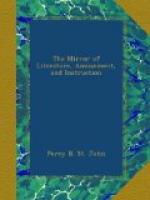THE DANDY TRAVELLER.
There is a class of travelling oddities—the dandy voyageurs of Britain, who, teeming with the proud consciousness of their excellence in comparison with the rest of human kind, swoln with self-sufficiency, float like empty bubbles on the water’s surface, and who seem as if they would break and be dissolved by contact with a vulgar touch. They contrive to swim by means of their air-blown vanity until they come into concussion with some material object, and are at once reduced to their proper level, and for ever annihilated. Their country is London; their domicile Regent-street; thence they would never travel, had they their wills,—not but they would like to see Paris, and move at Longschamps, or admire its beauties in an equipage a D’Aumont; but the horrors attendant upon such an enterprise are too formidable gratuitously to be encountered. It is only when a dip at the Fishmonger’s has been rather too often tried, or Stultz’s billets-doux have been repeated with increasing ardour on the part of the Tailor-lover until he delegates the maintenance of his baronial purse to some dandy-detesting attorney, that they feel it expedient to brave the dangers of sea and land, and, unscrewing their brass spurs, folding up their mustachios in a port-feuille, they hasten them from life and love, and London, and set them down at Meurice’s, the creatures of another element; not less new to all things around them, than all things there are new to them. It was not long since I met one at the table-d’hote of Mr. Money, the hospitable but expensive owner of Les Trois Couronnes, at Vevay, in Switzerland. A large party had assembled, composed of almost every European nation; and we had just commenced our dinner, when we were intruded upon by an Exquisite—a creature something between the human species and a man-milliner—a seven months’ child of fashion—one who had been left an orphan by manliness and taste, and no longer remembered his lost parents. Never can I forget the stare of Baron Pougens, (a Swiss by birth, but a Russian noble) as this specimen of elegance, with mincing step and gait, moved onward, something like a new member tripping it to the table to take his oaths. How he had got so far from Grange’s, I really cannot say; but he had the policy of assurance in his favour; and in his own idea, at the least, was what I heard a poor devil of a candle-snuffer once denominate George Frederic Cooke, the tragedian,—“a rare specimen of exalted humanity;” and the actor was certainly in a rare spirit of exaltation at the moment. His delicate frame was enveloped by a dandy harness, so admirably ordered and adjusted, that he moved in fear of involving his Stultz in the danger of a plait; his kid-clad fingers scarcely supported the weight of his yellow-lined Leghorn; all that was man about him, was in his spurs and mustachios; and, even with them, he seemed there a moth exposed to an




